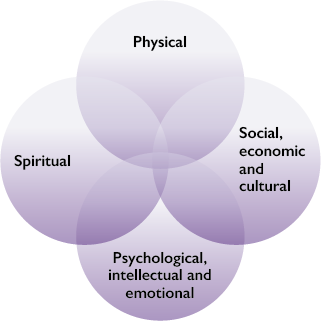What is a need?
A need can be described as something that is necessary, very important, or essential for a person to live a healthy and productive life. Needs are different from wants. Wants are things that are desirable, but not necessary or essential. Children, for example, have a need for food, because without food, they will not grow or be healthy, will be unable to learn well, work or play, and ultimately will die. People need food to survive. On the other hand, a person may want a particular type of food, preferring perhaps to have fish rather than vegetables. However, although they may want fish, they do not need fish to survive. Food is a ‘need’. Fish is a ‘want’.
Another way of distinguishing between needs and wants is that people have a limited number of needs. It is usually possible to identify all of a person’s needs, whereas people can have an infinite number of wants, which differ from person to person.
Human needs can be categorised in many different ways. Figure 3.1 shows one way of categorising them.

- Physical needs: shelter, health care, water and sanitation, protection from environmental pollution, adequate food, adequate clothing, and protection from violence, exploitation and abuse, exercise for strength-endurance-coordination, opportunities for development of physical skills.
- Social, economic and cultural needs: knowledge of and respect for one’s own language, religion and culture, stable social and economic environment, access to appropriate guidance and support, access to quality education, play and friendships, freedom from discrimination and prejudice, meaningful empowering work, and opportunities for service.
- Psychological, including intellectual and emotional needs and the need to be able to exercise choices: a stable and loving family environment, a sense of belonging and identity, age appropriate information, stimulation, and opportunities to be listened to and taken seriously, models for problem solving and critical thinking, a sense of worth, being valued by others, being able to contribute to or positively affect your world, opportunities to make choices and develop cognitive talents and creative potentials.
- Spiritual needs: exploration, understanding and appreciation of the nature of life, humankind and the universe – of what lies beyond time and material world, and the possibilities to connect with the infinite and ultimate.
Human needs can often be categorised under more than one heading. A child has, for example, a need for appropriate health care, which is a social need. At times, this need may be related to serious injury or illness, which is a physical need, or related to a mental health condition, which is a psychological need. A person may rely on prayer during a period of illness, exercising the need for spiritual support.
All children have the same needs. However, the way they require those needs to be met will be different in different circumstances, and at different stages of their development. For example, while children of all ages need emotional care and support, the form that this will take will necessarily be different for a 2-year-old than a 17-year-old. All children need opportunities to learn but a child who is blind will need provision of education that is differently adapted to that provided to a sighted child. An adolescent will need greater opportunities to make independent choices than a 5-year-old.
If needs, such as food, good sanitation, education and access to health care are not met, children will not be able to enjoy their childhood, or achieve their optimum level of development as they grow up.
3.3 Understanding children’s needs
